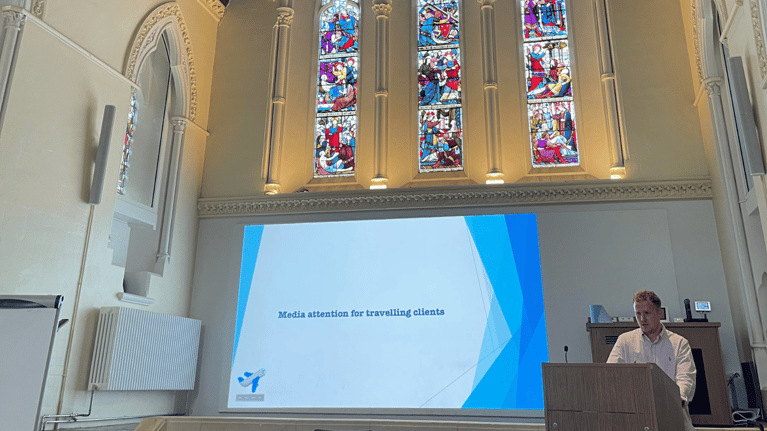
Why news sense is increasingly important in PR and how to develop it
The news is such a significant part of everyone’s lives. Its purpose is to inform the public, so that they can know about important events, and make informed decisions about their lives. Someone who regularly keeps up with the news will widen their outlook and enrich their knowledge.

How to demonstrate the value of online learning by using the media
Nothing irritates me more than when I’m reading something and I come across the aggressively vague remark that ‘online learning is here to stay’.

Three ways to promote academic expertise in the media
If knowledge were a form of currency, business schools would be printing presses. These prestigious institutions produce hundreds if not thousands of research papers every year, most of which have the potential to significantly benefit societies around the world, covering topics as diverse as reducing tax evasion, environmental stewardship, ethical leadership, and much more.

Diversity and inclusion communications for business schools - and why it matters
Diversity and inclusion within companies, business schools and in the media has become a much wider discussion over recent years, and rightly so. More and more people are learning the importance of inclusion, and more action is being taken every day. Whilst there is still a long way to go, every step taken is a step closer to equity. Business schools are no strangers to this, with many schools championing themselves as leaders in diversity and inclusion. This is often seen through their communications efforts, but how exactly is it done and why is it so important?

How to do PR in South East Asia
Home to over 650 million people, South East Asia is one of the most densely populated regions globally. It’s known for its beautiful coastline, diverse culture and fantastic cuisine, but it is also an emerging economic powerhouse.

How to work with journalists in The Netherlands
In the competitive market of European higher education, The Netherlands stands out as a key country for universities and business schools seeking international visibility.

7 tips for great thought leadership and content creation for academia
Thought leadership is a phrase that is often thrown around in the business sphere. To be a thought leader essentially means being an expert in a specific area and positioning yourself as someone people look to for advice on that topic.

Lessons from two of the best (and one of the worst) PR campaigns of 2023
It’s typical to make some form of resolution at the start of a new year – a commitment to ourselves to do better, be better than we were during the year before. Personal pursuits might include aiming to eat better, exercise more or simply to make more plans with family and friends.

How to do PR in Africa
Africa is the youngest continent in the world. In fact, according to the UN, 70% of sub-Saharan Africa is under the age of 30. Take this in comparison to the European Union, where less than 35% of citizens are under 30, the sheer number of young people across the continent offers an opportunity for huge growth.

How to secure business school coverage in a changing press landscape
If there’s one thing we’ve learned over the past few years, it’s that the pace that the norm can change is rapid. Whether it’s the covid pandemic changing our lives overnight, geopolitical events like conflicts or climate disasters disrupting the usual order, or new technologies drastically altering our habits – external factors can have a profound and quick impact on pretty much anything.

How to get coverage in science press
Science press aims to provide coverage on current scientific research and findings which are often especially relevant to current news and trends, from natural disasters and the impact of climate change to public health and the psychology of modern life; there are always scientific topics out there that the public love to read about. A widespread discipline, science press can specialise in different areas such as biology, chemistry, health, sustainability, and medicine, just to name a few.

Academics with more media coverage get more citations
Research is essential to society as it provides answer to questions of what, when, how and why. Without it, we wouldn’t have answers to key social, environmental, and economic issues that we have faced in the past, currently, and in the future.

Why an effective PR plan is crucial for attracting potential students to your school
As universities and business schools around the world face an increasingly competitive recruitment environment, it’s vital that educational institutions continue to come up with creative and strategic ways in order to attract students.

How to secure meetings for your faculty abroad
Securing media opportunities for faculty is one of a university or business school communications professional’s most important responsibilities.

Four approaches to research communication
The best research communications specialists are, to all intents and purposes, bilingual. To do the job well, you have to be able to converse fluently in complex academic terminology and translate it into the language of the everyday without simplifying or dumbing down.

How to support your Dean’s social media
While many business schools and universities are excelling with their institutional social media accounts, often the Dean or President focuses on this success, meaning their own individual social media can sometimes be forgotten. Yet, a Dean or a President utilising their social media can be incredibly important for visibility and connection to a wider community.

PR hacks for your business school’s online reputation management
Beyond traditional elements of branding like logos, colours, and messaging, your online reputation embodies the perception of your business school in the digital landscape. It encompasses what individuals say, think, and feel about your institution based on their online interactions, experiences, and encounters.

What education journalists really want
As a university or business school looking to get your alumni, research and professors featured in media opportunities, trade press can sometimes feel like an afterthought, particularly when your focus is on top-tier publications like the Financial Times, Forbes and the Economist.

The journalist said yes... now what?
If you’ve read our previous blogs on how to craft a compelling pitch or construct a powerful press release and have taken our advice to heart you’ll, hopefully, by now have been on the receiving end of some positive responses from journalists at your target publications.

How PR helps institutions talk about ESG efforts
Improving our relationship with the planet is vital as the lack of consideration for the natural environment is impacting more than just people (animals, ecosystems, etc.). A warming planet leads to changes in our climate, causing heatwaves to become more likely, and has exacerbated the cost of living as rising sea levels interrupt supply chains, affecting the availability and cost of goods.

Can universities pull off PR stunts?
Did you know that PR stunts can have real impact? Even for business schools and universities, a PR stunt can raise considerable awareness about the institution or an important individual. PR stunts can take many forms, but in order for them to work, originality is key.

6 Common misconceptions of PR
My journey with public relations started over 10 years ago. It’s now been over a decade since I signed up to study Public Relations & Communications as an undergraduate. Back then I remember family and friends asking me “So what actually is public relations?”.

How to secure international media opportunities if you can't speak the language
Language is essential to communications, but it seems that some people still underestimate the power it has. Choosing the right words and crafting compelling messaging is key to success in PR and communications efforts both at home and in international markets.

How to turn a crisis into media coverage
A once-held, later debunked belief in the Western world is that, in traditional Chinese, the word ‘crisis’ is made up of two other words: ‘danger’ and ‘opportunity’.

Your Dean shouldn’t be your main spokesperson. Here’s why...
Yes, they’re the Dean. Yes, they are the head of the school. But no, they shouldn’t be your only spokesperson.

What do journalists want and need from communications professionals?
Although 18 percent of journalists say their relationships with PR professionals have improved over the past year, 16 percent has said the relationship has gotten worse, according to Cision’s 2023 Global State of the Media Report. So, as a communications professional, you need to make sure you’re getting it right when it comes to working with journalists.

AI, subscriptions, and engagement: 5 key lessons from the Reuters Institute Digital News Report for Business Schools
How we cater to our insatiable appetite for instant information is constantly in flux, and technology is forever transforming how we consume news. The Reuters Institute Digital News Report, based on a YouGov poll of 93,000 people, provides a spread of insights into the habits, preferences, and behaviours of news consumers across different platforms and countries. As any good public relations professional will know, understanding a journalist’s or publication’s audience and medium is vital for cooking up that perfect pitch and getting your school into the news…

Why international PR is so different to domestic PR
When was the last time you sent out an email inviting a journalist to attend an on-campus event, and received a positive response? Or sent out a release under embargo, only to receive silence in response?

How to achieve success in British media
Like Britain’s once ice-blanketed countryside, the state of the UK media landscape is always evolving. Polar bears no longer prowl the Scottish Highlands and town criers screaming “hear ye! hear ye!” have become a scarce novelty.

How can public relations support marketing activities?
For those who don’t work in the field of communications, it is very easy to assume that public relations and marketing are pretty much the same thing. In fact, you’d find it hard to come by a PR professional who hasn’t described their job as ‘similar to marketing’ to their family, friends or virtually anyone new they meet.

PR buzzwords that are actually worth paying attention to
In the world of public relations, buzzwords can come and go faster than you can say "press release".

Public relations vs media relations, aren’t they the same thing?
Entering into the world of communications, PR and media relations can be confusing for some. At first, you may wonder what the difference is between public relations and media relations? But overtime, you will begin to notice the unique factors that they each bring to the table.

How business schools can use content marketing
In today’s digital age, traditional marketing strategies alone are no longer sufficient to capture the attention of prospective students. As a result, business schools and universities around the world are embracing newer approaches to engage with their target audience and stand out in a competitive landscape, and they’ve discovered content marketing.

Content marketing vs copywriting: 5 questions you should ask
To borrow a phrase from Bill Gates, “Content is King”. Content marketing and copywriting are commonly used terms in a marketing context, but they often get confused for each other. While they are related activities, it’s helpful to draw a sharp line between them. So, what are the differences, and where do they overlap?

Why should professors build their personal brand in the media?
Chances are, at some point in your career, someone will Google you. While you can’t ever completely control what appears at the top of the search engine results page, you can help to shape what information is available about you online. This can be done by building a strong personal brand.

Why PR planning is important
In the fast-paced world of public relations, where the news agenda evolves rapidly, professionals often find it challenging to keep up with an ever-changing landscape. Nonetheless, planning in PR is crucial to success! By developing a comprehensive PR plan, you can effectively navigate the media environment, align your messaging, and capitalise on opportunities. And a PR plan does not have to underscore every last detail! In fact, in such a dynamic world, being adaptable is a huge advantage…

“They didn't quote what I said! Why should I bother?”
5 reasons why you didn’t get quoted… The bread and butter of any public relations strategy is media engagement – securing opportunities to speak directly with journalists from a wide range of outlets, across your target audiences and geographies. Sharing your voice, your institution’s values, your expertise and successes with credible media gives you a greater platform to be seen and heard, as well as actively demonstrate your worth.

How to do media interviews when you don't know what to say
The media landscape is ever-changing, which is why it’s important to implement updated strategies that will keep you connected to your audience. One of the best ways to do so is through regular media interviews. Not only do they provide a platform to share your message, but they also help put a human connection to your institution, particularly if you’re the Dean or a key spokesperson.

The best business profile slots and how to secure them
It goes without saying that everyone wants to reach top tier media. It is also widely known that it is easier said than done. In this edition of our blog, drawing on insights from Roxhill Media and our own work, we’ll take a look at some of the best business profile slots in the UK, and I will provide some advice on how to gain success when pitching to the journalists who write the features.

How to promote research on social media
As an academic at a university or business school, you may spend countless hours researching, analysing data, and writing papers. Is this effort only worthwhile if your work is promoted and distributed to the audience to who it is aimed at? I imagine you’d answer yes to this. Well, social media is an amazing way for academics to publicise their research, the media coverage it gets, and engage with people beyond their institutions and peers.

Journalists are opening fewer emails from PR professionals – here’s what to do about it
We truly love working with journalists. There is an incredible amount of value to building and maintaining those working relationships, and it really can make working in PR even more enjoyable. Although, journalists can get quite a bad “rep” from other industries. Whether it’s for being unapproachable, or for never responding to emails, there can be a lot of grumbling when journalists come up in conversation. We believe that when pitching to journalists, there are some key things to do that will make both your life and theirs easier, creating a smoother process for all involved.

How can your institution promote itself on YouTube?
Did you know YouTube is the second largest search engine next to Google? People upload more than 100 hours of video per minute to YouTube! It’s one of the best ways to communicate to a wide audience, whether you’re promoting programmes or providing information to current students. It is an amazing tool for both your school and your students. How can you use YouTube to promote your university or business school? A short snappy intro video Find your niche Show what you have to offer Be consistent Invest in high quality video Student experience content Keep your comments on Make playlists Embrace your culture Congratulate your students and show off their success!

Why a compelling brand message is needed for PR
Some business schools that are world-renowned – whether that’s the likes of Harvard, Stanford or Wharton – can simply rely on little else than their reputation to attract the world’s best faculty, students and corporate partners.

The do’s and don'ts of working with journalists
Working with journalists can be daunting, especially if you are in a new position or have not done it before. However, journalists are also just normal people doing their job. Still, there are a couple of things you should consider when working with a journalist or setting up a meeting for another member of faculty. These “do’s and don’ts” are here to provide a guide for you when working with journalists.

Top tips for engaging with the media
A timeless truth, understanding what the media is after will always be fundamental to media success, irrespective of the specific year.

How to work with journalists in Italy
Italy is well-known for many things; Pizza, pasta, and gelato in the culinary sense; da Vinci and Michelangelo for artists; Armani and Versace in the fashion world; or Lamborghini and Ferrari if you’re into cars.

How universities can use hashtags properly
Hashtags are a feature of social media that can be difficult to understand, use, and keep up with. But, once you get the hang of them, the results are clear to see.

How to pitch to the UK business desks
Business desks are notoriously difficult to pitch to; they receive a high volume of pitches on a daily basis, leaving editors tasked to find the stories that are truly newsworthy. With strict deadlines, an audience to think about and often very limited resources – this can make news desks very hard to reach for PR professionals, like you and me.

How to engage students on social media
To the Gen Z community, the world of social media and online engagement is part of everyday life and has been for their entire teenage and adult years. It is something that, to a large extent, is their primary form of communicating with each other.

